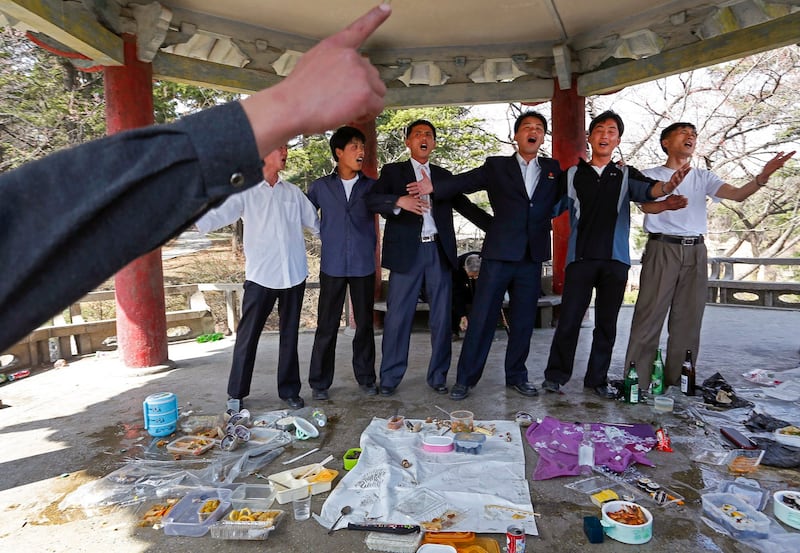North Koreans are growing weary of being bombarded by "Friendly Father," an upbeat propaganda song praising leader Kim Jong Un that has been blanketing the country for months now, sources in the country tell Radio Free Asia.
People are forced to sing it before every public event and a loudspeaker car drives through cities blaring it, said a resident of Ryanggang province in the north on condition of anonymity for security reasons.
“He is holding his 10 million children in his arms and taking care of us with all his heart,” go the lyrics.
“The love you give me is like the sea. The trust you give me is like the sky,” says verse two. “You are always by our side, and make all our wishes come true.”
The Ryanggang resident said that he has heard the song every day since it was introduced in April, except for a three-day break in early May due to the death of a high-ranking official.
“Every factory, company, school, work unit, and neighborhood-watch unit in the province has both children and adults sing this song whenever the opportunity arises.” he said.
Music video
The government created a high-quality music video for the song depicting people from all walks of life enthusiastically singing along to it.
Friendly Father was inspired by an earlier propaganda song called “Friendly Name” that sung the praises of Kim’s father and predecessor Kim Jong Il. The melody is different but many of the lyrics in “Friendly Father” are callbacks to the earlier song, which most North Koreans know by heart.

The order to promote the song comes from the Central Party of the ruling Korean Workers’ Party, the Ryanggang resident said.
It’s gotten to the point where people actively avoid places where the song is played publicly if they can help it, he said.
Deserted park
For example, in the city of Hyesan, on the border with China, there is a park where retired people gather to spend their free time by talking, singing, dancing, playing games or exercising.
But when the park turned off their music and began playing “Friendly Father” over the park’s public address system, the senior citizens went home, according to the resident.
“The manager forced them to stop dancing to a folk song but to dance in praise of the marshal instead,” he said, referring to Kim by his military rank.
RELATED RFA CONTENT
RFA Insider podcast Episode 6 (Timecode 13:50)
[ Upbeat video casts Kim Jong Un as North Korea’s father figure Opens in new window ]
[ North Korea bans karaoke, saying it smacks of ‘rotten’ capitalist culture Opens in new window ]
[ North Korea bans more than 100 patriotic songs that refer to reunificationOpens in new window ]
“The elderly people stopped dancing and began to return home. The song … rang out in the empty park where everyone had left one by one … until it was deserted.”
The park, which used to teem with old folks from sunrise to sunset, is now empty almost every day, he said.
Respect thy elder
Another problem with the song stems from Korea’s Confucian culture.
Often complete strangers are expected to grant older people a certain amount of respect simply because they are older, with the promise that they will receive the same respect from the young when they reach the same age.
However, “people in their 70s and 80s are being forced to call Kim Jong Un, who is only in his 40s and is about the same age as their sons, their ‘friendly father,’” the resident said.

The government’s push of “Friendly Father” is even more aggressive than its efforts to promote songs from the reigns of Kim Jong Un’s father and grandfather, a resident of the northeastern province of North Hamgyong told RFA who also asked not to be identified.
“Back then, their songs were sometimes played on broadcasting cars, but they did not make people sing at the start of every learning session or lecture session, nor was it forced upon the elderly, as they are doing right now,” he said.
People scoff at the notion that Kim Jong Un could be their “friendly father,” because they do not trust his leadership abilities, the second resident said.
“They have no hope in their leader, but they are forced to familiarize their eyes, ears, and mouths with the image of him as their friendly father through the song,” he said.
It seems that the propaganda efforts are getting bigger and louder as people’s dissatisfaction with society increases, he said.
Translated by Claire S. Lee and Leejin J. Chung. Edited by Eugene Whong and Malcolm Foster.
